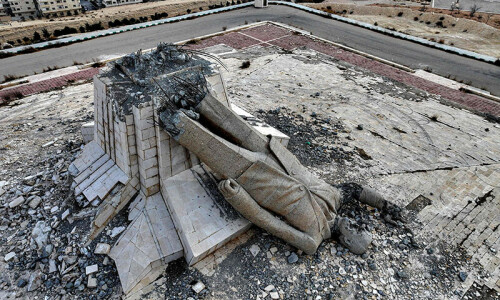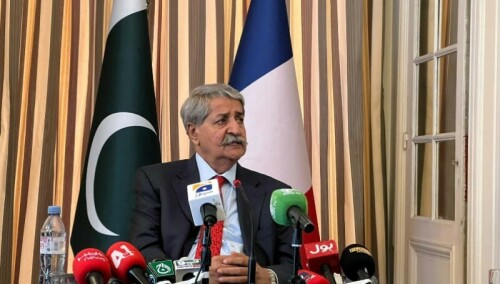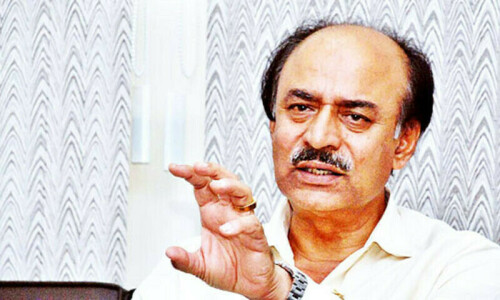 KARACHI: The Arts Council of Pakistan, Karachi, added another feather to its cap by organising an event on Friday night at which classical singer Ustad Fateh Ali Khan of Hyderabad (Gwalior gharana) and Farid Ayaz Al-Husaini — Abu Mohammad Qawwal and party paid tribute to the poetic and music genius of Amir Khusrau (1253-1325).
KARACHI: The Arts Council of Pakistan, Karachi, added another feather to its cap by organising an event on Friday night at which classical singer Ustad Fateh Ali Khan of Hyderabad (Gwalior gharana) and Farid Ayaz Al-Husaini — Abu Mohammad Qawwal and party paid tribute to the poetic and music genius of Amir Khusrau (1253-1325).
Appropriately, the function was titled Ahang-i-Khusravi.
While Fateh Ali Khan presented raags Aiman and Sazgiri and a Bihari Thumri, Farid Ayaz and Party presented various qauls of the great Sufi saint. Most of the compositions are attributed to Amir Khusrau. Right from Ghayasuddin Balban to Jalaluddin Khilji, the kings that sat on the throne of Delhi, were all very fond of music and had great respect for Amir Khusrau and patronized him no end.
Raag Aiman rendered by Fateh Ali Khan was set in 48-beat ektala and its drut was presented in teentaal. Raag Sazgiri, again a composition of Amir Khusrau, was set in 12-beat ektala.
Gwalior gayaki is distinctive for its open-throated singing and has no affinity with the Dhurpad-oriented Agra Gharana, made famous by Ustad Fayyaz Khan. To some people it may appear as a very aggressive style of singing.
Fateh Ali Khan is a recipient of a number of awards, including the Roshan Ara Begum Gold Award and the Pride of Performance. He has represented Pakistan in many festivals around the world. Belonging to the Gwalior gharana, he has an impressive lineage. Son of Ustad Ghulam Rasool Khan and grandson of Ustad Peyare Khan, his taya (elder brother of his father) was the famous Ustad Ummeed Ali Khan and his mamoon (maternal uncle) was that most respected and most popular classical singer of Sindh, Ustad Manzoor Ali Khan. Both these stalwarts lived their lives in Sindh and popularized classical music among the landed aristocracy as well as the masses.
Fateh Ali Khan himself is settled in Hyderabad. He claims that his ancestor, Ustad Mian Bannay Khan, was a disciple of the legendary Haddu-Hassu Khan (founders of the Gwalior gharana) and had the distinction of introducing Kheyal gayaki in the Punjab and Sindh. Haddu-Hassu Khan themselves were the disciples of Bade Mohammad Khan who was a Qawwal Bachcha, a group who traced their descent back to the time of Amir Khusrau. “It is believed that during the reign of Sultan Altutmish (1211-1236) there were two brothers in Delhi called Sawant and Bula. Amongst them, one was deaf and the other was dumb. The Badshah arranged a music program … someone told him of these two brothers (as a joke) but poor things, what could they sing? When Hazrat Khwaja-i-Khwajjagan learned of their plight, he prayed to God to open their voice, and God did so. Then he (Hazrat) commanded the two brothers to sing. As soon as they received the command, they got their voice and started singing. These two brothers’ khandan is known as the Qawwal Bachchhe khandan.” (P-149 The Life of Music in North India by Daniel M. Neuman).
The qawwali style of singing is a mixture of Persian and Indian models. It was introduced by Amir Khusrau and several of our modern Ragas are said to have been created by him. In the case of popular instruments, the Sitar, a modification of the Vina, and Tabla, a modification of Pakhawaj, are said to have been developed by him.
Farid Ayaz Qawwal is the descendent of Samit Ibrahim who was the principal shagird of Hazrat Amir Khusro. Ustad Tanras Khan of Dehli gharana who came from the family of Samit Khan was Farid Ayaz’s great grandfather and the famous Pakistani qawwal Munshi Raziuddin was Farid Ayaz’s father.















































Dear visitor, the comments section is undergoing an overhaul and will return soon.